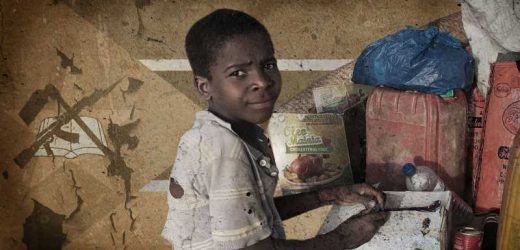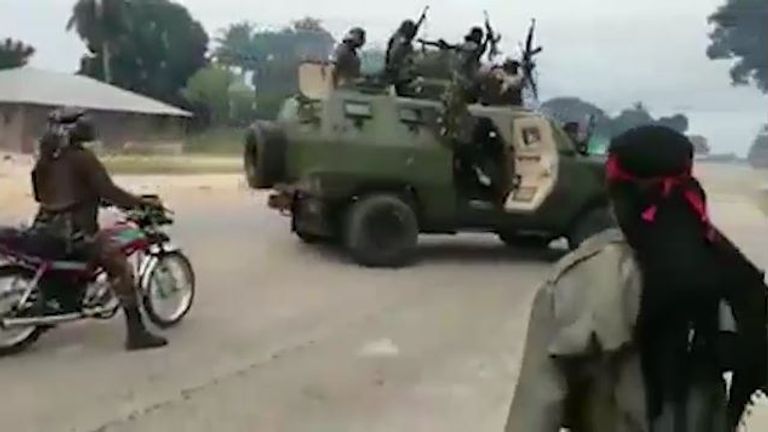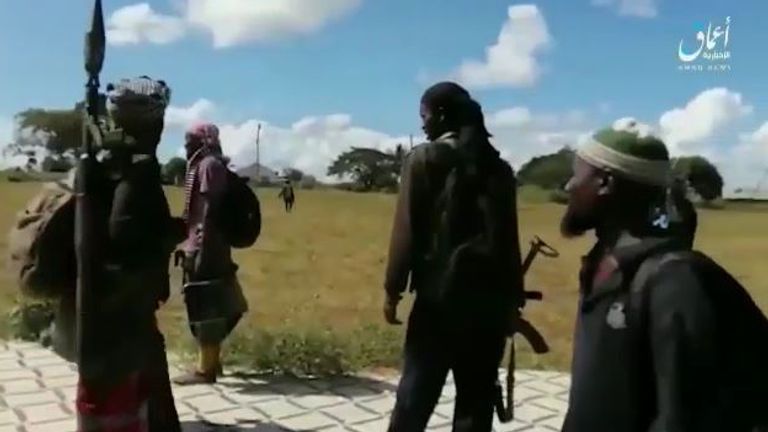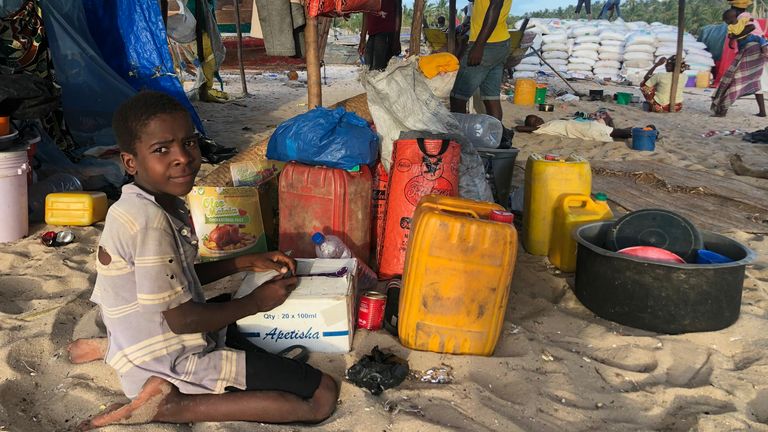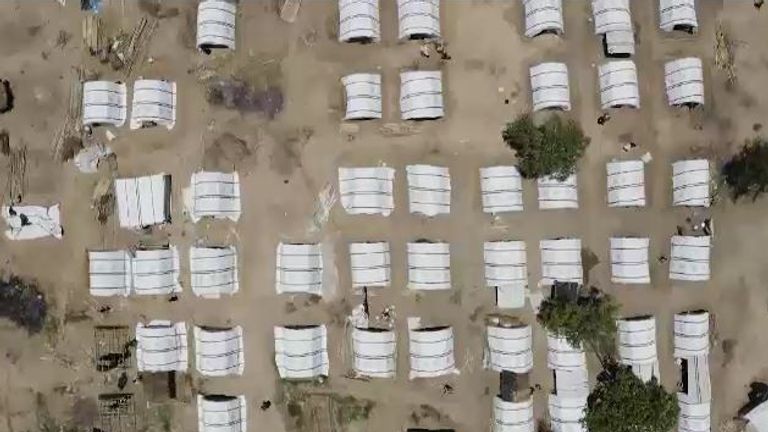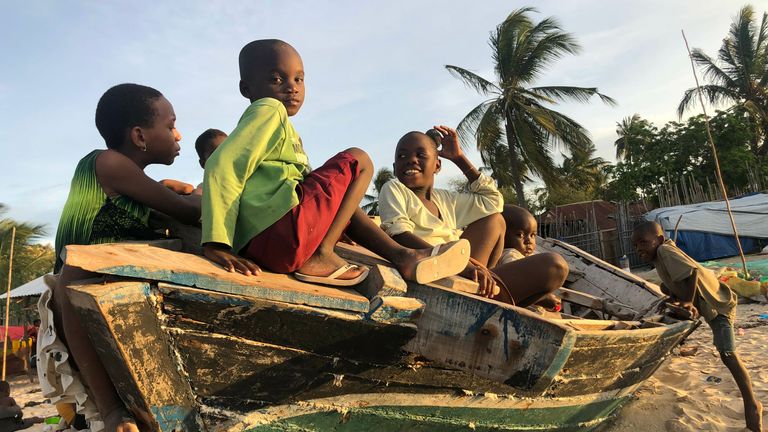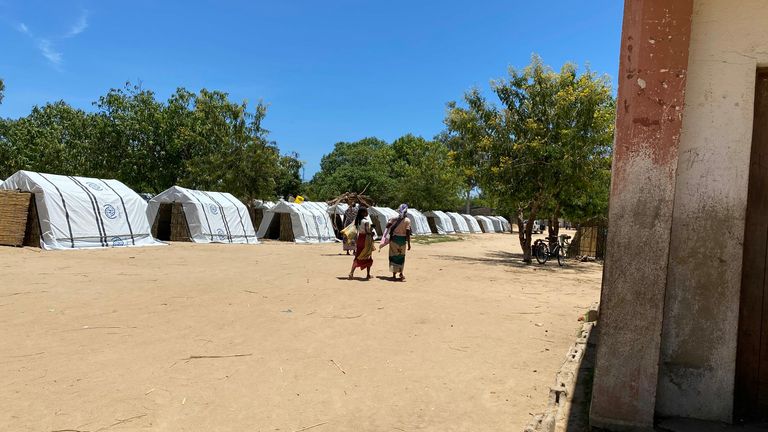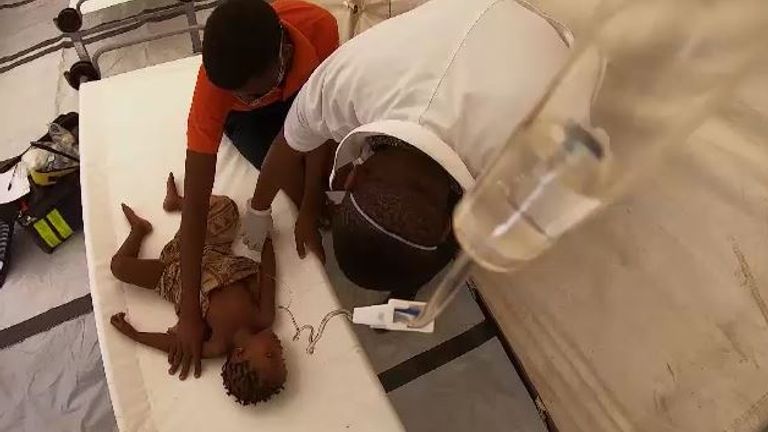More than 500,000 people have been displaced from a ruby and oil-rich region of Mozambique in what the UN has called “a perfect storm of instability”.
The people of Cabo Delgado, the country’s northernmost province, are dealing with an insurgency by Islamist militants, food insecurity, extreme weather, disease and government failures.
Reliable information is severely lacking from the region as journalists face intimidation, with two local reporters held for months in a military prison in 2019, while international media has been refused permission to enter.
As Sky’s Africa John Sparks reports, the crisis has gone largely unnoticed by the rest of the world.
This is what is happening.
Who are Ansar al-Sunna and when did the insurgency begin?
In 2017, a group calling itself Ansar al-Sunna (translation: supporters of the tradition) started carrying out attacks on government and civilian targets in Cabo Delgado, a province rich in rubies and oil and with a population that is 54% Muslim – whereas most of Mozambique is Christian.
The group was reportedly formed in 2015 by followers of the radical Muslim Kenyan cleric Aboud Rogo Mohammed, who resettled in Mozambique after his death in 2012.
Mozambicans call them Al-Shabaab, but they are not the same as the terror group in Somalia.
Ansar al-Sunna want to establish an Islamic state in the region and claim the Islam practised in Mozambique has been corrupted and no longer follows Muhammad’s teachings.
Its members, which have grown to the thousands, have tried preventing people from going to hospitals or schools as they consider them secular and anti-Islamic.
Mozambicans make up the majority of their members, many who hold grudges against the government, but they are also known to come from Tanzania and Somalia.
The group has become increasingly violent since 2017 and is now calling for Sharia law across Mozambique, while it no longer recognises the government and has created hidden training camps to fight against the military.
There have been numerous attacks on government buildings, mosques and civilians, with decapitations and the burning down of houses becoming their modus operandi.
Since March 2020, the violence has increased further and the insurgents have taken control of numerous villages, towns and districts, and the conflict has crossed the border into Tanzania.
Islamic State involvement
Ansar al-Sunna members rarely claim to be part of Islamic State (IS) and do not often use propaganda like the terrorist group does.
However, Al-Shabaab trainers from the Somalia terror group were reportedly hired to help train Ansar al-Sunna militants and then acted as mercenaries for them.
Since 2017, they have increasingly been linked to IS.
Mozambique’s government denied IS was operating in the country until April 2020, despite reports the group had infiltrated northern Mozambique in April 2018.
In April 2020, IS claimed responsibility for killing 52 villagers who refused to join them and five months later declared the strategic port town of Mocimboa de Praia the capital of their province.
They continue to carry out attacks, some in coordination with Ansar al-Sunna.
Massive displacement and loss of life
More than 2,500 people have been killed in the conflict since it started in 2017.
By December 2020, more than 530,000 people (nearly a quarter of Cabo Delgado’s population) had been displaced from the province into neighbouring Nampula, Zambezia and Niassa provinces, UNHCR, the UN’s refugee agency, said.
Most of those people were displaced in the last few months of 2020 and the numbers continue to rise.
People have been forced to flee their homes, leaving without their identification and civil documents in most cases, making them even more vulnerable.
Most of them are being given shelter by other communities, meaning they are living in cramped and inadequate conditions, while others are living in temporary camps.
Women and girls are “significantly vulnerable to gender-based violence”, with many being abducted, forced into marriages or prostitution, raped or subjected to other forms of sexual violence, the UNHCR said.
More than half of those displaced are women and nearly 15,000 are pregnant, but 36% of Cabo Delgado’s health facilities have been damaged or destroyed.
Extreme weather, COVID-19, cholera and food insecurity
The World Food Programme (WFP) has said the violence is pushing hundreds of thousands of people into food insecurity.
Cabo Delgado has the highest rate of chronic malnutrition in Mozambique, with more than half of the children malnourished.
“The situation is dire,” Lola Castro, WFP’s southern Africa regional director, said – as she urgently called for $132.4m (£96.5m) to feed people there for a year.
She said more than 900,000 people in Cabo Delgado and its two neighbouring provinces, including displaced people’s hosts, are now facing “crisis” or “emergency” levels of food insecurity.
This is being exacerbated by the pandemic, flooding and disease outbreaks – a “perfect storm of instability”, said Dr Julitta Onabanjo, the UN Population Fund’s east and southern Africa regional director.
Cyclones Idai and Kenneth, the strongest tropical cyclone to ever make landfall in Mozambique, hit the country hard in March and April 2019 respectively, killing more than 650 people and causing massive infrastructure damage.
Tropical Storm Chalene ushered in 2021, followed by Cyclone Eloise three weeks later, shattering the recovery progress from 2019 and displacing more people across Mozambique.
As well as dealing with COVID-19, other diseases are a major issue. In a camp outside Pemba that Sky News visited, doctors in a makeshift hospital were dealing with malnourished people, those with malaria, and a cholera outbreak.
What are the Mozambique government and the world doing?
Initially, police were dealing with the insurgents. But as attacks became more frequent, the military was sent in and has been battling them ever since.
The Russian government sent over two military helicopters in late 2019 after signing a military and technical cooperation agreement two years before.
Russian mercenaries and defence contractors have been helping local forces and in 2020, South Africa sent in special forces troops to help, with South African private contractors also helping.
Mozambique’s neighbours fear the conflict is spilling into their countries and have accused President Felipe Nyusi’s government of being ineffective and reluctant to ask for help.
Troops have seen heavy losses during the conflict, including when more than a hundred died in an unsuccessful days-long offensive to take back control of Mocinboa da Praia.
In September 2020, the government requested assistance from the EU, which was approved a month later.
But Portugal’s foreign minister, whose government holds the rotating six-month EU presidency, said the bloc’s help was “very low” and needs to be increased, specifically by training local forces.
EU foreign minister Josep Borrell Fontalles said not everything can be blamed on Ansar al-Sunna, adding: “The armed violence in the northern part of Mozambique was triggered by poverty and inequality and by the population of the areas losing respect for a state which could not provide it what it needed.
“Mozambique has the third-largest natural gas reserve in Africa after Nigeria and Algeria. You can imagine that this leads to citizens feeling alienated. It is a rich country and they are mired in poverty.”
The US reportedly asked Zimbabwe, a country it has placed sanctions on, to help Mozambique.
In November 2020, the UN called for an international response to the insurgency, with Tanzania and Malawi launching a joint military operation with Mozambique forces soon after.
President Nyusi also met US counter-terrorism officials for discussions, but the attacks continue to increase.
Source: Read Full Article
